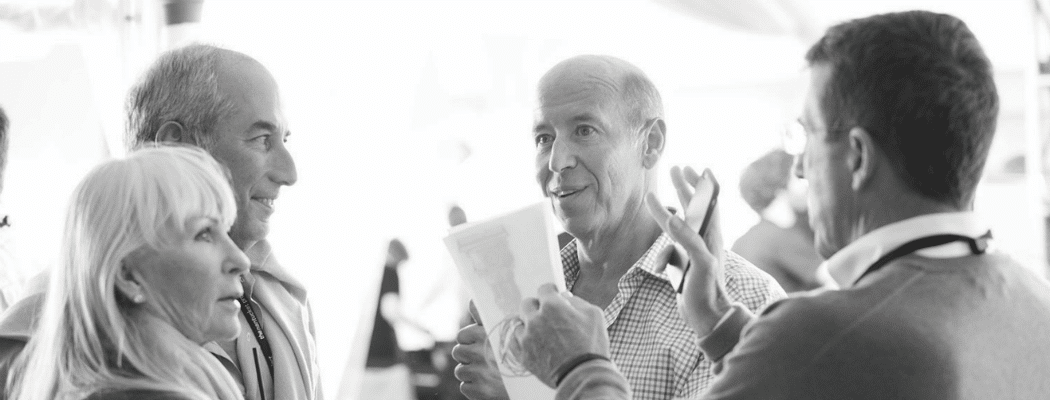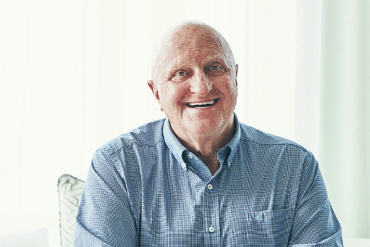One of the world’s most powerful hoteliers weighs in on the future of the hospitality industry.
Barry Sternlicht is credited with having revolutionized the hotel industry. Creating emotional connections with his consumers, Sternlicht’s hotels have raised the bar throughout the hospitality business and have made him one of its most influential figures. In the wake of the coronavirus, Sternlicht has emerged a vocal thought leader as to how the economy should reopen. Most recently, he was enlisted by a White House committee tasked with strategizing how to put the country back to work. Having spent close to forty years summering on Nantucket, Sternlicht is also keenly aware of the challenges the island faces in the months to come. N Magazine spoke with him during the last week of April to get his insights on the future of the hospitality industry, the economy as a whole, and what Nantucket could look like a year from now.
 N MAGAZINE: The hotel business is certainly in the crosshairs of the coronavirus. The effect of COVID-19 on the hospitality business is catastrophic. How does the industry right itself after this?
N MAGAZINE: The hotel business is certainly in the crosshairs of the coronavirus. The effect of COVID-19 on the hospitality business is catastrophic. How does the industry right itself after this?
STERNLICHT: The nation is now split into the pessimists and the optimists. Some people think we’re going to change our habits forever. I’m not one of those people. I think Americans are blessed and cursed with a short-term memory. People will go back to the way they were. The other question is: How long does it take to get there? The first thing that will come back are the drive-to hotels. In favor of Nantucket, vacations will be favored over business travel. But then that means a whole bunch of things have to change along the route, from the house to the hotel. How do they get there? Do they feel safe on the plane? Were they temperature-tested? Was everyone wearing a mask? But I think this will pass. I’m going to hold onto that hope, because there’s no reason to be pessimistic about it. Because if [the pessimistic view is] true, then we’re headed toward the Great Depression, because the service industry employs something like 35 million people, whether it’s in restaurants or hospitality or cruise ships or airlines.
N MAGAZINE: How do you think hotels will need to adjust when they reopen?
STERNLICHT: In the beginning, hotels are going to learn to operate with 35, 45, 55 percent occupancies. We will learn new ways to clean and disinfect. But everyone’s going to do something to restore and instill confidence with the whole value chain. I urge the entire industry to come up with one standard. It’s silly for Marriott to have one cleaning program and Hilton to have theirs and for us to have our own. Everyone should get together to standardize these practices and make them consistent. Because it’s consistency that breeds confidence.
N MAGAZINE: The hospitality business at large has a lot of highly leveraged operators where the failure rate in hotels could be as high as 50 percent nationally. That’s both a problem and an opportunity. Do you believe that the hotel business will be decimated to that extent?
STERNLICHT: I’ve said that this is World War III for three months and we’re about halfway through that. If we don’t reopen, yes, the hotels will fail. Looking at my own hotels that are closed today, it’s one thing not to pay interest expenses, but we still have to pay real estate taxes, insurance comp and maintenance expenses. We have to keep our hotels and systems operating. So it’s not net zero—we are actually losing money. We tried to pay our employee benefits for as long as we could, so they could get their healthcare even while they weren’t employed. It’s a huge cash drain, and the average hotel owner probably doesn’t have that kind of money. Every Holiday Inn in the United States is owned by a family, usually with the family working there. They don’t have the resources to not be open. They’ll have to figure out how they can break even at 30, 40, 50 percent occupancy.
 So we have to open. We don’t really have a choice in my view. Otherwise you could see a disaster scenario for the U.S. hotel industry. Yes, that would be an opportunity for us to buy assets, but I’d rather not see that happen because that means there will be such destruction in
So we have to open. We don’t really have a choice in my view. Otherwise you could see a disaster scenario for the U.S. hotel industry. Yes, that would be an opportunity for us to buy assets, but I’d rather not see that happen because that means there will be such destruction in
the economy that we won’t recognize the country.
N MAGAZINE: How do you think this compares to the Great Depression?
STERNLICHT: I had a conversation with Charlie Munger from Warren Buffett’s Berkshire Hathaway a couple days ago on a Zoom video. He’s ninety-six, so you can actually ask him what it was like during the Great Depression. He said that years into the Great Depression, you just didn’t have any idea how anyone was going to get a job. But right now, you know exactly how people are going to get a job. They’re going to go back to the job they left, whether it was in the hotel, airline, restaurant, cleaners, barbershop or the gym. And so the question is, what’s the pace of getting them back to work?
N MAGAZINE: Other than the major drop when the virus hit, the stock market has rebounded substantially. You’ll see headlines that are dire, and then you’ll see the market go up. Is there a disconnect or is the collective wisdom of the stock market telling us something?
STERNLICHT: On March 13th, I said the stock market would rocket up. I had no idea I’d be so right about that. It’s rallied further and faster than I would have thought. I cited five reasons and I think they’re all in play. Interest rates are as low as they’ve ever been in U.S. history, which means there is no place to put cash except maybe in the stock market. Oil prices were down then and have crashed since then. Then you have global stimulus where there has been something like 380 stimulus packages passed around the world. The world is swimming in cash and all that money has to go somewhere. It’s going into debt and equities, and it’s inflating the value of stocks again. Then, it’s the flu and it’s going to pass. The market has decided [the coronavirus is] going to pass faster than most of us think. They look at China, at Spain, at Italy, at France and see that it’s got an eight-to twelve-week life cycle. Finally, you have technology. I hear these guys go on TV and talk about the Spanish flu in 1918. Think about the technology in 1918 compared to the technology a hundred years later. We have all the world’s laboratories and scientists and doctors combining resources to find either a vaccine or a cure or both. The odds of them succeeding faster than we think are quite high. I think the collective wisdom of the market is that, “yeah, earnings are going to be down, probably really down for a while, but coming out of this, it could be like a spaceship.” I don’t see that by the way. I think the market is ahead of itself. People aren’t quite internalizing the damage.
N MAGAZINE: America is known for its exceptionalism. Are you disappointed with the fact that the United States was not more prepared, and is probably a lot worse off than a number of lesser developed countries in the world?
STERNLICHT: Yeah, I’m devastated. It’s ridiculous. We had a pandemic council under Bush, and then they basically disbanded it under Obama. Of course, Trump had his own cuts to the health care system. George W. Bush gave a speech about pandemics where he said this was going to happen. In a multi-trillion-dollar budget, you’d think we could find some money to prepare the country. It’s unconscionable that we let this happen. But it kind of goes to one of our weaknesses: our short-termism. We did a terrible job, just terrible. When the flu hit, we knew about it and we didn’t do anything about it. We could have at least prepared the masks and the ventilators and the low-tech stuff that we could prepare in the trillions if we had done it on time. We knew it was coming; we just ignored it.
 N MAGAZINE: What is going to be critical to keeping people safe as we reopen?
N MAGAZINE: What is going to be critical to keeping people safe as we reopen?
STERNLICHT: Tracking is so important because of the delay in getting this disease. I was speaking with a technology executive a couple nights ago, and we had this discussion about technology where you could be at a dinner party and then two weeks later somebody at the dinner par- ty gets COVID-19. This technology could send you an email and say, “You were in contact with somebody who had COVID-19. You should get yourself tested.” It won’t identify you. It won’t even tell you where you came in contact with that person to protect identities. It will just have your GPS code on your phone and will just say: “You should go get tested.” Americans don’t like having their privacy invaded, but this is something that should almost be required. If we’re going to continue to be panicked about this, then we should track. They’re doing it in China and it’s probably one of the smartest things we can do.
N MAGAZINE: The summer that we’re facing on Nantucket is going to be unlike any summer that maybe we’ve ever had. A year from now, how do you see life on Nantucket?
STERNLICHT: I think next summer will be fine. As I said, I come from the optimistic school. I think it will be more or less back to normal. The hysteria will die down and this will go into the bag as a really, really bad flu. Nantucket is going be great. It’s a spectacular place. I expect people will stay a little longer, and I can’t wait to get to the island.








